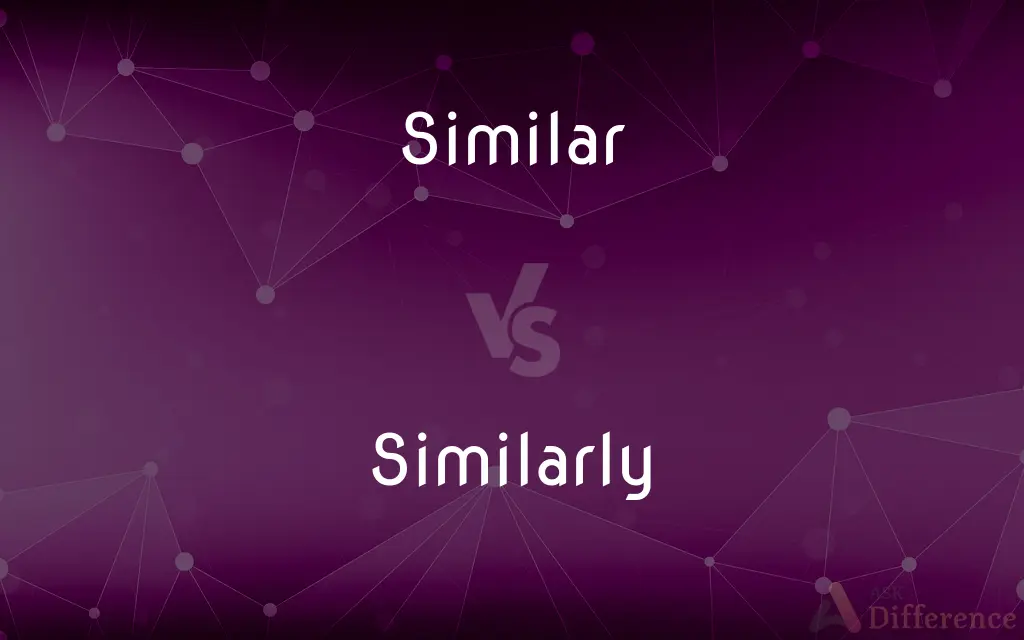Similar vs. Similarly — What's the Difference?
Edited by Tayyaba Rehman — By Maham Liaqat — Updated on April 24, 2024
"Similar" is an adjective used to describe resemblance between entities, while "similarly" is an adverb indicating that actions are done in a comparable manner.

Difference Between Similar and Similarly
Table of Contents
ADVERTISEMENT
Key Differences
"Similar" is primarily used as an adjective, implying a likeness or resemblance between two or more things. It suggests that while things are not identical, they share enough characteristics to be considered alike. On the other hand, "similarly" functions as an adverb, used to express the manner in which an action is performed is alike to another previously mentioned action.
When discussing objects or concepts, "similar" is directly applied to nouns to modify them, such as in phrases like "similar features" or "similar ideas". Conversely, "similarly" modifies verbs or entire sentences, indicating that something is done in a similar way, as in "He voted for the proposal; similarly, she supported the initiative."
"Similar" can be used to compare any elements, whether they are tangible, like cars and bicycles, or intangible, like ideas and theories. Whereas "similarly" is used to link actions or thoughts, suggesting a parallel in the way things are approached or understood.
In usage, "similar" requires a point of comparison, often followed by "to" or "with," for example, "Her writing style is similar to mine." Similarly, "similarly" is used to draw parallels between how different actions or events are conducted, such as "She works hard; similarly, her colleagues put in great effort."
In educational and formal writing, "similar" helps in drawing analogies or making comparisons between scholarly subjects. On the other hand, "similarly" is useful for creating coherence in arguments or narratives by linking similar lines of reasoning or action sequences.
ADVERTISEMENT
Comparison Chart
Part of Speech
Adjective
Adverb
Usage Context
Modifies nouns
Modifies verbs or entire sentences
Example Usage
"similar interests"
"acted similarly"
Comparative Needs
Requires a comparison point ('to', 'with')
Used to draw parallel actions
Common in
Descriptive texts, comparisons
Argumentative writing, linking actions
Compare with Definitions
Similar
Resembling without being identical.
The twins have similar facial features.
Similarly
Likewise or also.
He is passionate about music; similarly, he loves dance.
Similar
Bearing likeness to something.
The plot of the movie is similar to a famous novel.
Similarly
In a like manner.
She speaks softly; similarly, her sister speaks gently.
Similar
Alike in substance or essentials.
They hold similar views on the subject.
Similarly
Echoing the method of.
Just as you suggested, similarly, I took the same approach.
Similar
Corresponding in function or position.
The buttons on different software are similar.
Similarly
Reflecting a similar circumstance.
As the economy grows, similarly, employment rates increase.
Similar
Comparable in nature or quality.
Their skills are similar in many ways.
Similarly
Parallel in action or logic.
They voted yes; similarly, the motion passed unanimously.
Similar
Having a resemblance in appearance, character, or quantity, without being identical
Northern India and similar areas
A soft cheese similar to Brie
Similarly
Having a resemblance in appearance or nature; alike though not identical.
Similar
A person or thing similar to another
He was one of those whose similar you never meet
Similarly
(Mathematics) Having corresponding angles equal and corresponding line segments proportional. Used of geometric figures
Similar triangles.
Similar
A substance that produces effects resembling the symptoms of particular diseases (the basis of homeopathic treatment)
The principle of treatment by similars
Similarly
(manner) In a like style or manner.
The sisters dressed similarly.
Similar
Having a resemblance in appearance or nature; alike though not identical.
Similarly
(conjunctive) Used to link similar items
Similar
(Mathematics) Having corresponding angles equal and corresponding line segments proportional. Used of geometric figures
Similar triangles.
Similarly
In a similar manner.
Similar
Having traits or characteristics in common; alike, comparable.
My new car is similar to my old one, except it has a bit more space in the back.
Similarly
In like or similar manner;
He was similarly affected
Some people have little power to do good, and have likewise little strength to resist evil
Similar
(mathematics) Of geometrical figures including triangles, squares, ellipses, arcs and more complex figures, having the same shape but possibly different size, rotational orientation, and position; in particular, having corresponding angles equal and corresponding line segments proportional; such that one can be had from the other using a sequence of rotations, translations and scalings.
Similar
Of two square matrices; being such that a conjugation sends one matrix to the other.
Similar
That which is similar to, or resembles, something else, as in quality, form, etc.
Similar
(homeopathy) A material that produces an effect that resembles the symptoms of a particular disease.
Similar
Exactly corresponding; resembling in all respects; precisely like.
Similar
Nearly corresponding; resembling in many respects; somewhat like; having a general likeness.
Similar
Homogenous; uniform.
Similar
That which is similar to, or resembles, something else, as in quality, form, etc.
Similar
Marked by correspondence or resemblance;
Similar food at similar prices
Problems similar to mine
They wore similar coats
Similar
Having the same or similar characteristics;
All politicians are alike
They looked utterly alike
Friends are generaly alike in background and taste
Similar
Resembling or similar; having the same or some of the same characteristics; often used in combination;
Suits of like design
A limited circle of like minds
Members of the cat family have like dispositions
As like as two peas in a pod
Doglike devotion
A dreamlike quality
Similar
(of words) expressing closely related meanings
Similar
Capable of replacing or changing places with something else;
Interchangeable parts
Common Curiosities
Can "similarly" be used as an adjective?
No, "similarly" is an adverb.
What is the function of "similarly" in a sentence?
It modifies verbs or clauses to indicate a similar manner of action.
What part of speech is "similar"?
"Similar" is an adjective.
Can "similarly" start a sentence?
Yes, it can start a sentence to connect it logically with a previous statement.
How do "similar" and "similarly" contribute to academic writing?
"Similar" helps in making comparisons, "similarly" in linking ideas or actions.
How does "similar" function in a sentence?
It modifies nouns to denote resemblance.
How can one avoid redundancy using "similar"?
By varying comparisons with synonyms like "alike" or "comparable."
Is "similar" used with specific prepositions?
Yes, typically "to" or "with."
Is it correct to say "similar than"?
No, the correct phrase is "similar to."
Can "similarly" link entire paragraphs?
Yes, it is often used to create flow between paragraphs by highlighting similarities.
What is a common mistake with using "similarly"?
Overusing it in a way that disrupts natural flow in text.
Share Your Discovery

Previous Comparison
Collaboration vs. Quislingism
Next Comparison
Settee vs. SetterAuthor Spotlight
Written by
Maham LiaqatEdited by
Tayyaba RehmanTayyaba Rehman is a distinguished writer, currently serving as a primary contributor to askdifference.com. As a researcher in semantics and etymology, Tayyaba's passion for the complexity of languages and their distinctions has found a perfect home on the platform. Tayyaba delves into the intricacies of language, distinguishing between commonly confused words and phrases, thereby providing clarity for readers worldwide.














































